As cryptocurrency and NFTs continue to grow in popularity, so do the risks of falling victim to scams. From phishing schemes to fake giveaways, bad actors are constantly finding new ways to exploit the uninformed or overly trusting. This comprehensive guide explores the most common crypto and NFT scams, along with actionable tips to safeguard your assets and avoid being a victim of fraud.
Phishing Scams
Phishing scams target users by creating fake websites or sending fraudulent messages that appear legitimate. These scams often involve:
- Fake Wallets or Exchanges: Fraudsters replicate the appearance of trusted wallets or exchanges to steal login credentials.
- Email or Text Links: Users are tricked into clicking malicious links that prompt them to enter sensitive information.
- Social Media Phishing: Scammers impersonate trusted brands or influencers, sharing malicious links on platforms like Twitter and Telegram.
How to Protect Yourself:
- Always double-check URLs for accuracy.
- Avoid clicking links from unsolicited emails or texts.
- Use two-factor authentication (2FA) for an added layer of security.
- Bookmark official websites of wallets and exchanges to avoid typing errors that lead to phishing sites.
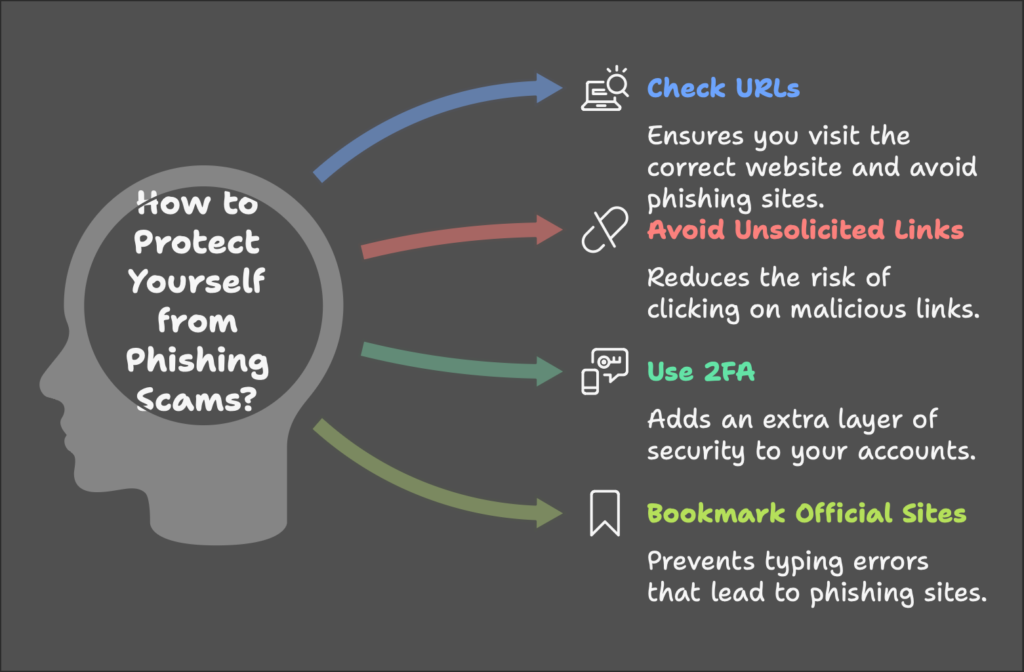
Pump-and-Dump Schemes
In pump-and-dump scams, fraudsters artificially inflate the price of a cryptocurrency or NFT by promoting it heavily. Once the price skyrockets, they sell their holdings, leaving others with worthless assets.
How to Spot a Pump-and-Dump Scheme:
- Exaggerated Claims: Beware of projects promising massive returns or guaranteed profits.
- Anonymous Teams: Projects with no identifiable team members are often high-risk.
- Unusual Market Activity: Sudden and dramatic price increases without a clear reason can indicate manipulation.
How to Protect Yourself:
- Be wary of investment opportunities promising guaranteed returns.
- Conduct thorough research on a project before investing.
- Avoid making decisions based solely on social media hype.
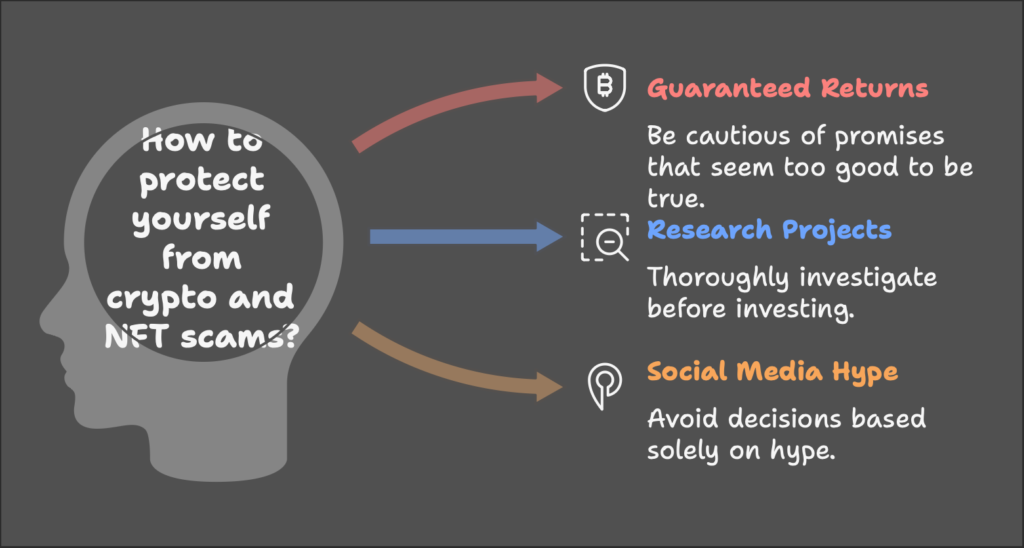
Fake Giveaways
Scammers impersonate celebrities, influencers, or reputable companies, offering “free” cryptocurrency or NFTs. These fake giveaways usually ask users to send cryptocurrency as a “verification step.”
Common Tactics in Fake Giveaways:
- Celebrity Impersonation: Fraudsters often use fake social media accounts of high-profile figures like Elon Musk or major brands.
- Urgent Calls to Action: Messages urging immediate participation to “secure your spot” in the giveaway.
How to Protect Yourself:
- Remember: Legitimate giveaways never require you to send money.
- Verify the authenticity of giveaways through official channels.
- Avoid sharing wallet addresses with unverified sources.
- Report suspicious accounts or posts to platform administrators.
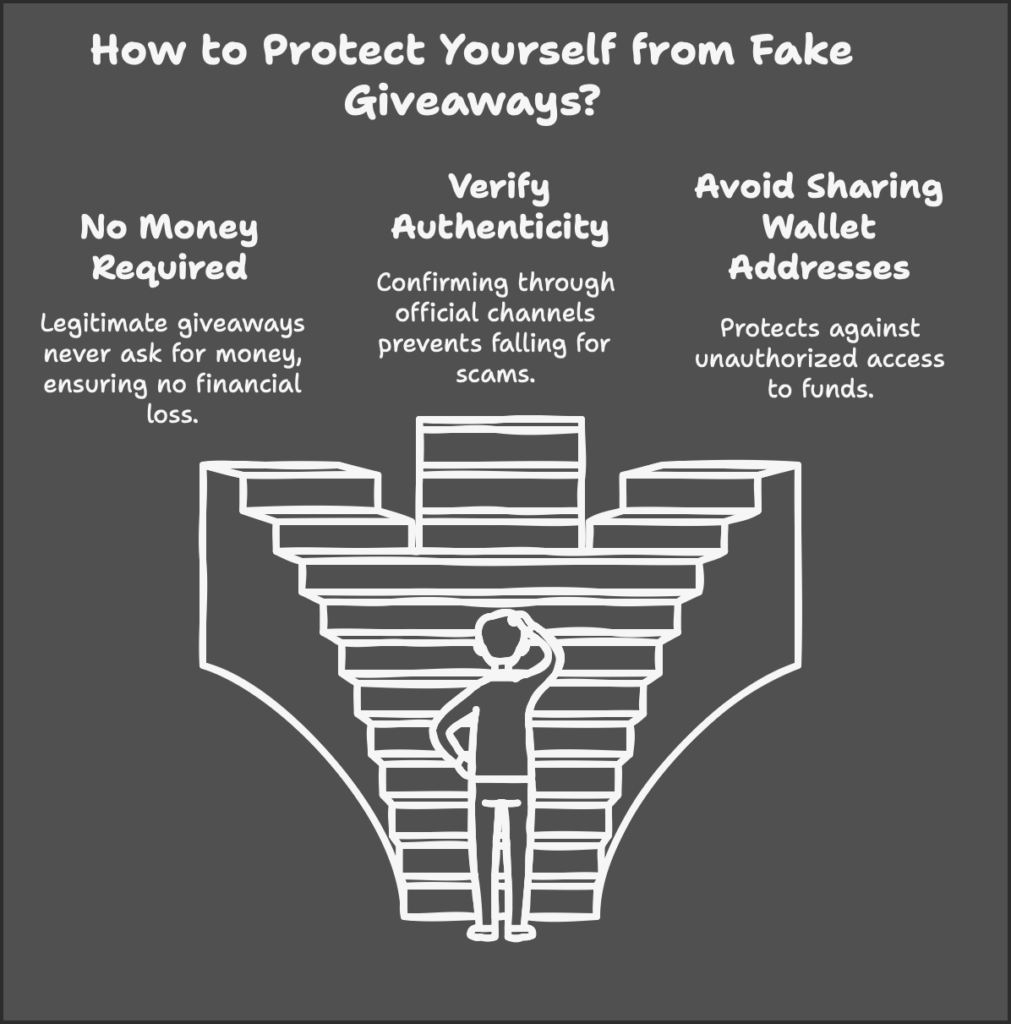
Rug Pulls
A rug pull occurs when developers of a project suddenly withdraw funds and abandon the project, leaving investors with worthless assets. This is common in DeFi projects and NFT collections.
Types of Rug Pulls:
- Liquidity Rug Pulls: Developers remove liquidity from decentralized exchanges, making it impossible to trade the token.
- Abandoned Projects: Teams stop working on the project after raising funds.
How to Protect Yourself:
- Investigate the project team’s background and reputation.
- Look for audits or third-party reviews of the project’s code.
- Avoid investing in projects with anonymous or unverifiable teams.
- Check for locked liquidity or multi-signature wallets for added security.
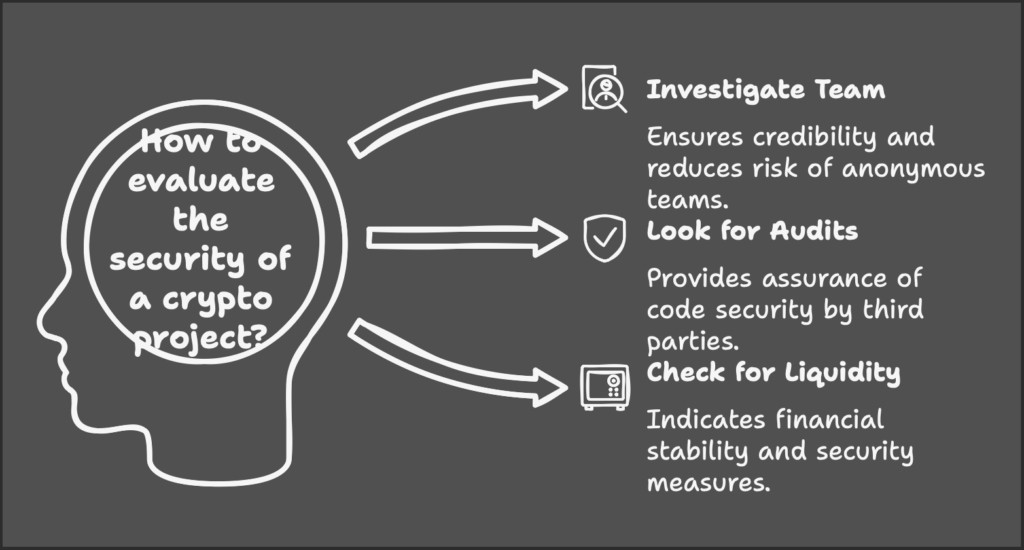
Social Engineering Scams
These scams exploit human psychology to trick users into revealing private keys or passwords. Common tactics include:
- Impersonation: Fraudsters pretend to be customer support representatives.
- Urgency: Scammers create a false sense of urgency to pressure users into sharing sensitive information.
- Emotional Manipulation: Scammers often exploit trust by posing as friends or family members in need.
How to Protect Yourself:
- Never share your private keys or seed phrases with anyone.
- Be cautious of unsolicited messages claiming to offer help or assistance.
- Use official support channels for inquiries.
- Double-check the identity of anyone requesting sensitive information.
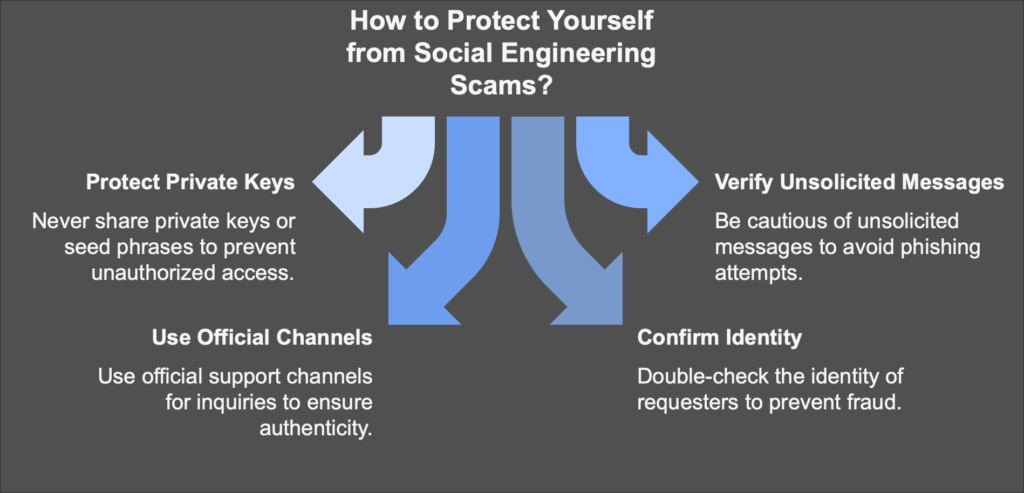
Fake Marketplaces and NFTs
Scammers create fake marketplaces or sell counterfeit NFTs to unsuspecting buyers. These platforms often mimic legitimate ones but lack proper security measures.
Signs of Fake Marketplaces:
- No Verification Process: Legitimate marketplaces verify both creators and collections.
- Poor Website Quality: Look out for low-quality designs and broken links.
- No Community Presence: Trusted platforms usually have active and transparent communities.
How to Protect Yourself:
- Only use reputable NFT marketplaces like OpenSea, Rarible, or Foundation.
- Verify the authenticity of NFT creators and their collections.
- Check for reviews or community endorsements before making a purchase.
- Use tools like blockchain explorers to validate NFT ownership.
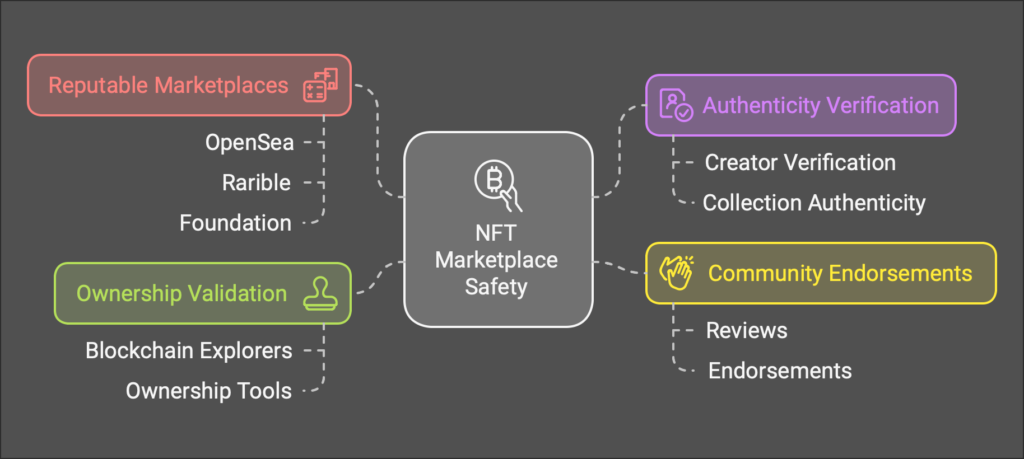
Ponzi and Pyramid Schemes
These schemes promise high returns to early investors, funded by money from new participants. Eventually, the scheme collapses when new investments dry up.
How to Spot a Ponzi Scheme:
- Guaranteed Returns: Promises of consistent, high returns with little or no risk.
- Referral Systems: Emphasis on recruiting others to maximize rewards.
- Lack of Transparency: Little information on how the returns are generated.
How to Protect Yourself:
- Be skeptical of opportunities guaranteeing high, risk-free returns.
- Avoid projects that require recruiting others to earn rewards.
- Investigate the project’s structure and revenue model.
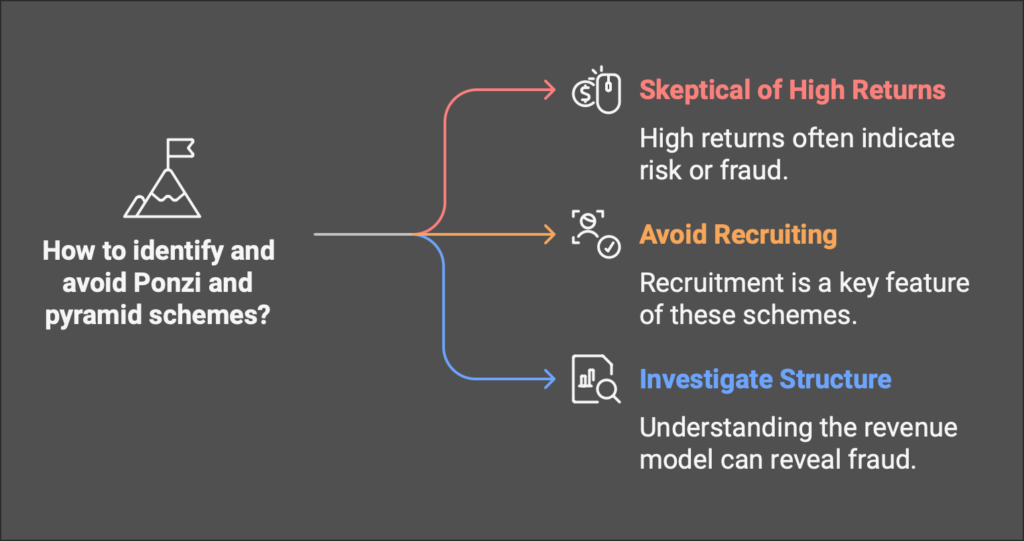
Malware and Hacking
Cybercriminals use malware or hacking techniques to steal cryptocurrencies and NFTs. This can involve keyloggers, fake apps, or vulnerabilities in wallets and exchanges.
Common Hacking Tactics:
- Fake Wallet Apps: Malware disguised as legitimate wallet apps.
- Clipboard Hijackers: Malware that changes wallet addresses when pasted.
- Exchange Hacks: Targeting centralized platforms to steal user funds.
How to Protect Yourself:
- Install antivirus software and keep it updated.
- Use hardware wallets for storing large amounts of cryptocurrency or valuable NFTs.
- Regularly update your wallet and exchange passwords.
- Avoid downloading apps from unverified sources.
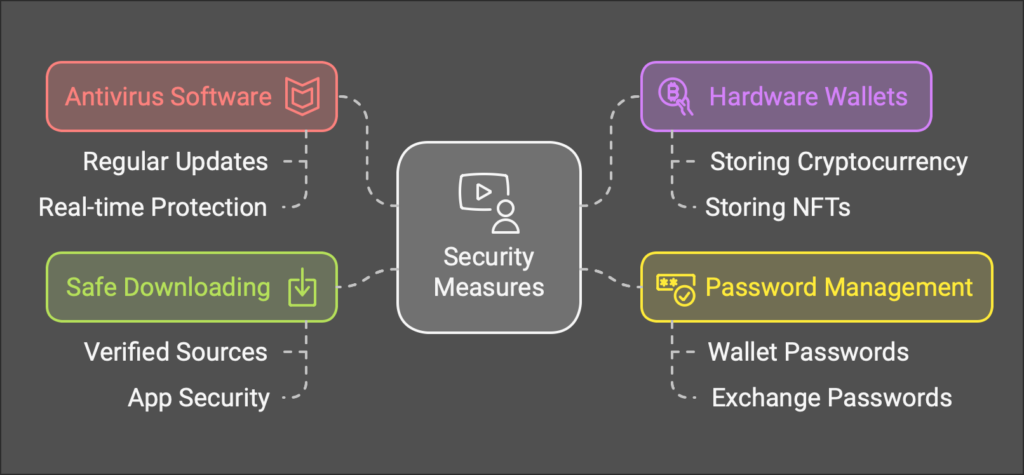
Educational Scams
Some scammers pose as educators or experts, selling courses or materials that promise to teach users how to profit from crypto or NFTs but provide little value.
How to Protect Yourself:
- Research the educator’s credentials and reputation.
- Look for genuine reviews or testimonials.
- Avoid paying for information that’s freely available online.
Conclusion
While cryptocurrency and NFTs present exciting investment opportunities, they also come with risks. By staying informed about common scams and practicing good security habits, you can protect your assets and enjoy the benefits of the digital economy.
Stay safe in the crypto and NFT world by following The Finance Bot for expert tips, guides, and the latest security updates.




As cryptocurrency and NFTs continue to gain traction, it’s crucial to stay vigilant against the increasing number of scams. Phishing schemes and fake giveaways are just a few of the tactics used by fraudsters to exploit unsuspecting individuals. This guide provides valuable insights into common scams and offers practical tips to protect your assets. Always verify the authenticity of any offer or platform before engaging. How can we better educate the community to recognize and avoid these sophisticated scams? Given the growing economic instability due to the events in the Middle East, many businesses are looking for guaranteed fast and secure payment solutions. Recently, I came across LiberSave (LS) — they promise instant bank transfers with no chargebacks or card verification. It says integration takes 5 minutes and is already being tested in Israel and the UAE. Has anyone actually checked how this works in crisis conditions?
Cryptocurrency and NFT scams are becoming increasingly sophisticated, making it crucial to stay informed and vigilant. Phishing schemes and fake giveaways are just a few of the tactics used by scammers to exploit unsuspecting individuals. It’s essential to verify the authenticity of any platform or offer before engaging with it. Always use secure wallets and enable two-factor authentication to protect your assets. How can we better educate the public to recognize and avoid these scams? German news in Russian (новости Германии)— quirky, bold, and hypnotically captivating. Like a telegram from a parallel Europe. Care to take a peek?